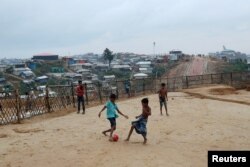One year after Myanmar's minority Rohingya Muslims began fleeing a military crackdown by the tens of thousands to neighboring Bangladesh, the government says it is safe for returns to begin. But some international observers disagree.
Those who survived the scorched earth campaign last August told aid workers in Bangladesh of unspeakable crimes, including watching their loved ones being raped and killed, watching their villages being burned to the ground, and seeing landmines being buried so they could not return.
A half-million Rohingya fled to Bangladesh in the first month alone, and about 200,000 more followed in the next few months. Today, Cox's Bazar in Bangladesh is the world's largest refugee camp.
"This is something we cannot but call ethnic cleansing," said Adama Dieng, U.N. special adviser on the prevention of genocide. His words echo those of his boss, U.N. Secretary-General Antonio Guterres, and the High Commissioner for Human Rights, Zeid Ra'ad Al Hussein.
Dieng visited the camp in March.
"Following my visit in Bangladesh, precisely in Cox's Bazar, where I met with the refugees, I reached the conclusion that their case, if ever brought before a court of justice, may amount to the crime of genocide," he said.
Myanmar authorities strongly dispute such accusations.
"There is no evidence at all that this is ethnic cleansing, let alone genocide," Myanmar's U.N. ambassador Hau Do Suan told VOA. "This kind of branding and accusation needs concrete evidence. It also needs legal proof."
Decades of discrimination
The Rohingya are one of several ethnic minorities in Buddhist-majority Myanmar. They are considered to be economic migrants from Bangladesh and are denied citizenship, even though most can show that their families have been in Myanmar for generations. They are discriminated against and are not allowed to move freely. They lack access to education and health care.
An insurgent group known as the Arakan Rohingya Salvation Army (ARSA) has emerged out of tensions with the government in recent years. Last August, the militants attacked police posts in Rakhine, killing a dozen policemen. The military responded with a campaign that U.S. Ambassador Nikki Haley called "disproportionate and indiscriminate."
The U.S. has imposed sanctions on several military commanders and two units for their role in the abuses.
One year later
"The situation on the ground is now quiet, and we have been able to restore peace and stability in the region," Myanmar's U.N. envoy said.
Myanmar and Bangladesh signed an agreement in November on the return of the Rohingya to Myanmar. Ambassador Hau Do Suan said they have received a list of 8,000 names from the Bangladeshi authorities and have verified more than 3,000 people on it. His government has given a list of 1,200 verified residents to Bangladesh.
"So, we are waiting for the start of the repatriation from the Bangladesh side," he said. But he said so far, no one has been repatriated.
Human rights advocates worry that the conditions are not yet ripe for the Rohingya to return.
"The period of the most acute violence is over. But what we know is that the fundamental issues at the root of the crisis have been completely unresolved," said Matthew Wells, senior crisis adviser at Amnesty International.
Myanmar's de facto leader, Aung San Suu Kyi, has been heavily criticized for not taking stronger action to resolve the crisis.
"If you take the temperature on the ground in Myanmar, the average citizen does not care about the Rohingya," said Debra Eisenman, managing director of the Asia Society's Policy Institute. "In fact, many are pleased."
She noted the outsized role that social media, particularly Facebook, has played in spreading anti-Rohingya propaganda.
"So, folks feel that the military has cleared the threat," she said.
'Accountability is critical'
"We need justice," Dieng said. "Accountability is critical." He said it will reassure victims that their suffering is taken seriously and will serve as a deterrent to potential abusers.
"We need to see a referral to the International Criminal Court by the U.N. Security Council," Wells added. "The crimes that were committed in northern Rakhine state are crimes under international law. Crimes against humanity. And that means that countries around the world need to ensure that an independent body investigates what took place and ultimately holds the perpetrators responsible."
Myanmar has established its own Commission of Inquiry, comprised of two international experts and two domestic ones. But observers are skeptical that it can carry out its mandate, especially after its inaugural news conference. Commission Chair Ambassador Rosario Manalo of the Philippines told reporters, "I assure you there will be no blaming of anybody ... no finger-pointing of anybody, because we don't achieve anything by that procedure."
Myanmar's U.N. envoy expressed "full confidence" in the commission.
"No one is above the law, so [if] there is concrete evidence, we will take actions," Hau Do Suan said.
Moving forward
"One year down the road, the picture is still very grim," Dieng told VOA. "What we are seeing is that despite this commitment made, we still have the Rohingya population moving out of Myanmar."
The U.N. said this week that it continues to receive reports of violence, and that between January and June of this year, more than 11,000 new refugees arrived in Bangladesh.


